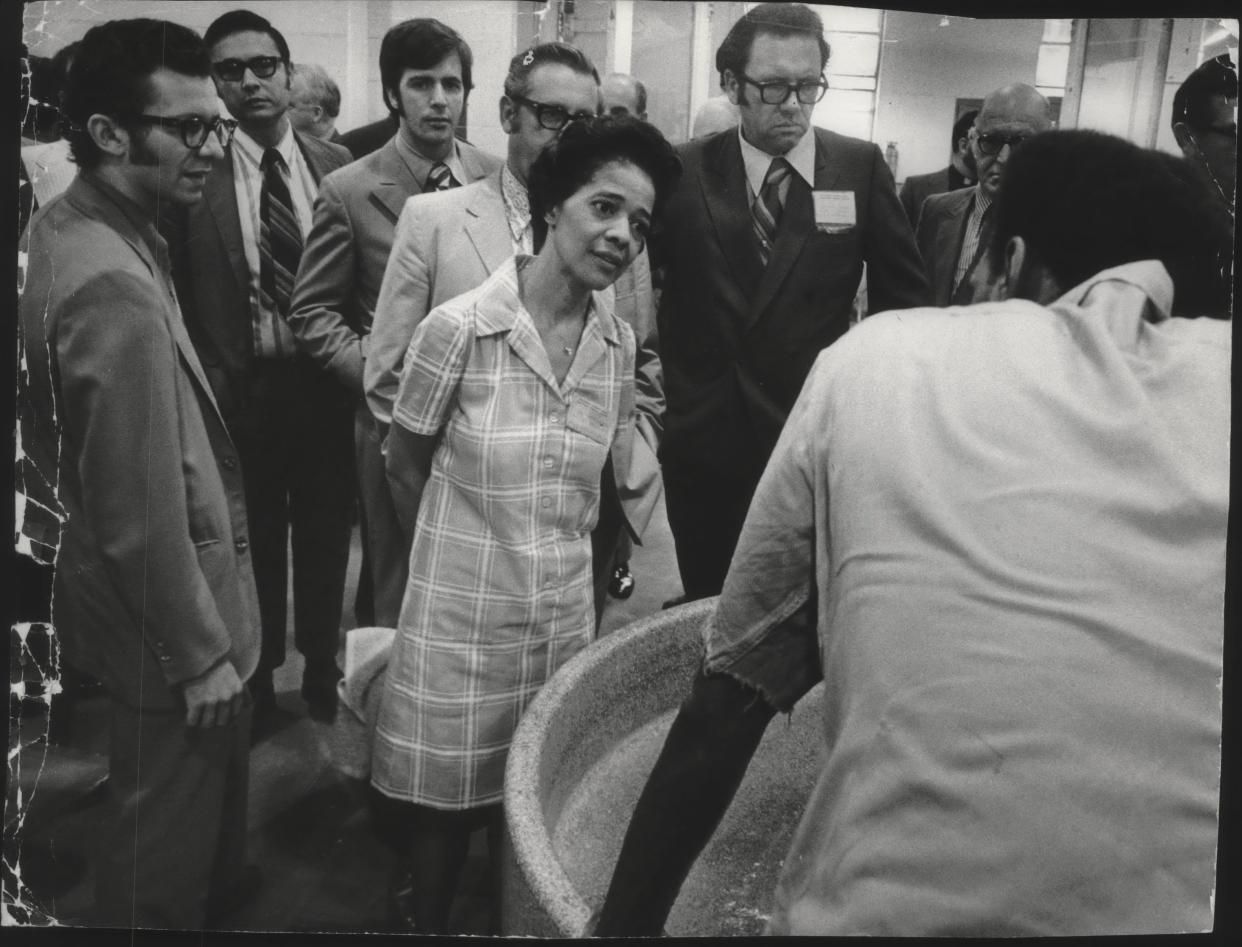What Vel Phillips saw when she visited Waupun, Taycheedah prisons in 1971

More than 50 years ago, a celebrated Milwaukee alderwoman toured three state prisons and decried the conditions she witnessed there — problems that persist today.
Vel Phillips, a Wisconsin civil rights legend who will be memorialized with a statue on the State Capitol grounds this month, railed against the lack of care for prisoners, petitioned for more transparency and witnessed a judge faint during her visit in 1971.
At the time Phillips, the first woman elected to Milwaukee Common Council, was just days away from taking a seat on the bench at Milwaukee County Children's Court, according to a Milwaukee Sentinel article.
She visited a women's prison, Taycheedah Correctional Institution in Fond du Lac, and two men's prisons in Waupun with a group that included two state Supreme Court justices, their clerks and court administrators.
Built in 1854, Waupun has a troubled history and has faced intense scrutiny in the past year after the facility entered a lockdown in March 2023 and four prisoners died, resulting in civil lawsuits and criminal charges in two of the deaths.
Phillips criticized lack of showers at women's prison
Phillips, then 47, had two issues she wanted to highlight during her Taycheedah visit.
She criticized prison officials for not making a greater attempt to find Black employees and she scolded the prison's warden for utilizing a "lockup" system that resulted in prisoners receiving only one bath or shower every three days, the Sentinel article states.
Phillips believed the women at Taycheedah deserved a shower daily.
"This isn't a situation where we feel (the prisoners) should be bathed every day," said then-Warden Lewis L. McCauley. "That's not what we've been taught."
Access to a shower remains a concern for prisoners and advocates today. Sometimes when a prison restricts movement, prisoners get only one shower per week, even though Wisconsin state law says they should receive at least two.
Racial disparity in prison population, staff persists
Taycheedah had no Black employees in 1971, even though the population was 50% Black, something Phillips thought was of concern, according to the Sentinel article.
"I don't think you've made a great effort to recruit" Black employees, she said.
The warden responded that "efforts are being made."
Today, Taycheedah's prison population is about 24% Black, while only about 3% of corrections officers are Black, according to the Wisconsin Department of Corrections. Statewide, about 41% of prisoners are Black, while about 11% of corrections officers are Black.
Worried about the judges' safety at Waupun
Phillips and the judges visited two men's facilities that day as well in Waupun in Dodge County. The first was the State Prison, now known as Waupun Correctional Institution.
The judges took a tour of the cell blocks but were not permitted to see the disciplinary unit. Carl R. Manthe, the prison's associate warden, said the warden did not want them to go into that area for safety.
When the governor's task force had visited recently, prison officials had a difficult time maintaining order, he told Phillips and others.
The group continued to the social services part of the prison and education unit where a sign read, "We'll learn you high school," training and shop areas.
Across the street at what was then known as the Central State Hospital for the Criminally Insane, now Dodge Correctional Institution, one of Phillips' fellow judges fainted.
Milwaukee County Circuit Judge Maurice Spracker fainted in the chapel during a slide presentation. He sat out the rest of the tour, saying he had an upset stomach earlier in the day.
Phillips called for more transparency in prisons
In recent decades, politicians have toured some of the state's troubled prisons and criticized those who did not.
For Phillips, the reason for the tour was simple: transparency.
"I came to observe, to ask questions and to learn," she said in 1971. "Every good jurist should know as much as possible about the correctional institutions, their operations, their treatment, programs, assets and successes, as well as their deficiencies."
"We send people to (prisons) so we should have more than a superficial knowledge of them," she added. "This has been a very worthwhile experience."
Drake Bentley can be reached at DBentley1@gannett.com.
This article originally appeared on Milwaukee Journal Sentinel: Milwaukee's Vel Phillips visited Waupun, Taycheedah prisons in 1971

